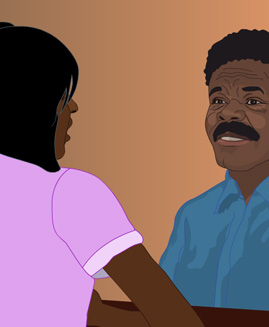Look at these images to learn about the roles and responsibilities of people who work in the mental health sector. | ||

Consumer
This term describes a person who receives or has received a mental health service. Not all people use this term; people prefer other words such as survivor, service-user, or client. The term was developed to indicate that a consumer is a person who has rights, including a right to complain if not satisfied with a service.
Carer
A carer is a person who provides support to someone with a mental illness. They are often family members or friends.

Self-help groups
People may support themselves and each other in self-help groups on numerous mental health issues, such as eating disorders and sexual abuse.
Advocate
An advocate represents their own or someone else's interest and speaks on their behalf. There are many forms of advocacy in mental health. A Consumer advocate is a person who has had personal experience of mental health problems.
A legal advocate in the field of mental health can offer assistance from advice to representation. Lawyers can act as legal advocates at hearings related to the Mental Health Act, Review Tribunals or hospital hearings that consider whether a detained person should be released.

Community mental health nurse
Community mental health nurses are registered nurses with specialist training who work in the community. They are generally employed by the community mental health team located within a specific health service area. The role of the community mental health nurse can be very wide and can include:
- offering counselling or anxiety management or exploring different coping strategies with people with acute short term difficulties
- working with people who have had severe mental health problems for many years and who need long term support to live in the community
- administering psychiatric medications.

Social worker
Social workers may be involved in mental health in a number of ways and work in a variety of settings. Social workers offer:
- advice on practical matters like accommodation or financial benefits
- referrals to appropriate services
- advocacy
- counselling, family support and education.
Case manager
Case management is provided for consumers and carers who are likely to require support from a range of different agencies. The person who takes on the role of coordinating care or providing support is the case manager. This role includes:
- making an assessment of the client's needs
- designing an individual support plan with the consumer and with relevant agencies
- monitoring with the consumer the effectiveness of the plan.
The case manager can be a nurse, social worker or other mental health worker.

General practitioner (GP)
Between a quarter and a third of a GP's workload will be concerned with emotional or psychological difficulties. GPs can talk through problems, prescribe medication or make referrals as they see fit. Many mental health problems are dealt with by GPs without referral elsewhere.
Occupational therapist
Occupational therapists work in mental health units, community clinics and in community mental health teams. Their role is to help people with mental health problems to build up the confidence and skills needed for personal, social, domestic, leisure or work activities. They focus on the learning of specific skills or techniques including:
- arts, crafts, drama, dance, writing
- group work
- anxiety management and assertion training
- individual counselling
- daily living training.

Psychologist
Clinical psychologists have a first degree in psychology (the study of mental phenomena) and a master’s degree in clinical psychology with a minimum of one year's experience. Their training centres on scientific principles to understand human experience and action, including thoughts, feelings and behaviour.
Clinical psychology has developed from behavioural methods to a much broader approach. It is possible to find clinical psychologists offering a wide range of treatments to assist people to recover. Treatment interventions include:
- behaviour therapy
- cognitive therapy
- psychotherapy.
Cognitive therapy can help people identify patterns of thinking and logic that can influence their behaviour.

Psychiatrist
Psychiatrists are medically qualified doctors who have taken further training and specialise in mental illness. The consultant psychiatrist is the most senior member of the team with overall responsibility for patient assessment and care.
Psychiatrists are not only hospital based. Some work in community mental health centres or in multi-disciplinary teams. They work closely with a number of different mental health professionals including:
- psychologists
- social workers
- mental health nurses.
Psychiatry is generally influenced by biochemical explanations for mental illness. Treatments within psychiatry therefore tend to be predominantly physical, such as medication and electroconvulsive therapy.

Psychotherapist, Psychoanalyst and Counsellor
There are three main types of "talking" therapy:
- psychotherapy
- psychoanalysis
- counselling.
There are differences in the methods used, the intensity and length of treatment and in the training the therapist receives. Other professionals also sometimes offer "talking" treatments. For example a community psychiatric nurse, psychologist, occupational therapist, and social worker.

Community mental health teams
These teams play a major role in the recovery of long term institutionalised patients. They provide assessment, case management, supervision and support for people with a mental illness living in the community. They also can provide support and information to the families of people with a mental illness.
Crisis care/emergency teams
These teams provide 24 hour emergency help for people with a mental illness who are in crisis. These teams are mobile and can assess people in their homes or on the street.